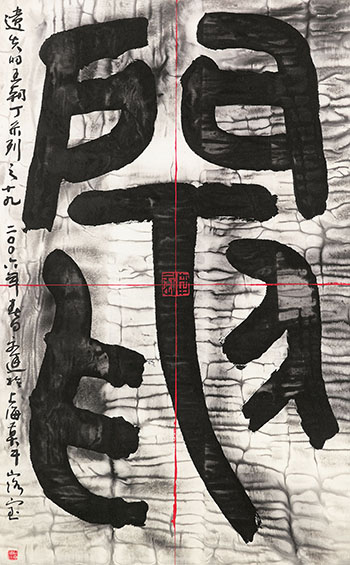

Lot 52
Mythos of Lost Dynasties Series J No. 19
GU Wenda (Chinese, 1955)
2006
Ink on paper
113.6 x 76.6 cm
Estimate
TWD 508,000-763,000
HKD 120,000-180,000
USD 15,500-23,200
Sold Price
TWD 504,202
HKD 120,000
USD 15,484
Signature
Series J No.19 , inscribed studio on Moganshan Road in
Shanghai and dated Spring 2006 all in Chinese
With two seals of the artist
Private collection, USA
+ OVERVIEW
Gu Wenda was one of the leaders of the New Art Movement in China in 1985. In the early 1980s, he used misalignment and dismemberment in Chinese calligraphy to create ink wash paintings. He challenged the orthodoxy and influenced many artists subsequently. In his early years, Gu studied landscape painting from Lu Yan-shao but his subsequent artistic path diverged from traditional ink painting. His works continue to subvert and challenge our impressions of the genre. Lu remarked once that "Gu isn't just a horse, he's a wild stallion." Compared with the breakthroughs in both subject matter and medium achieved by popular contemporary ink paintings in recent years, Gu possesses a more profound understanding of the genre and is focused on achieving aesthetic breakthroughs.
Since 1983, Gu has been committed to the deconstructed exploration of Chinese characters, calligraphy and ink wash painting. His Pseudo Character Series, a project Gu undertook in the new millennium, combined radicals and Chinese characters to form "Gu-style simplified characters" with traditional ink painting. The pictographic quality of Chinese characters contrasts and combines with the images in the background; there is a painting within characters and characters within the painting.
In his works "Mythos of Lost Dynasties", the artist combines seal script calligraphy and his own original "simplified characters". The tangible landscape background is replaced with large patches of ink smudges and the pictographic quality of seal script complements the ink-smudged rice paper to create a certain balance. The picture is often divided into four portions at the center, using two thin red lines with the seal of the artist, ceasing any attempt by the viewer to understand the text.
Modern & Contemporary Art
Ravenel Autumn Auction 2015 Hong Kong
Sunday, November 29, 2015, 11:00am
